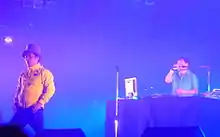Denki Groove
Denki Groove (電気グルーヴ, Denki Gurūvu, "Electric Groove") is a Japanese music group founded in 1989. It consists of Takkyu Ishino and Pierre Taki.[1]
Denki Groove | |
|---|---|
 Pierre Taki (left) and Takkyu Ishino (right) performing live in Japan, 2011 | |
| Background information | |
| Origin | Shizuoka, Shizuoka Prefecture, Japan |
| Genres | |
| Years active |
|
| Labels |
|
| Associated acts | Scha Dara Parr |
| Website | www |
| Members | |
| Past members |
|
History
Denki Groove was founded in 1989 by Takkyu Ishino and Pierre Taki, both of whom are natives of Shizuoka, Shizuoka Prefecture.[2]
The group's major-label debut studio album, Flash Papa, was released in 1991, the first being 662 BPM by DG in 1990.[3] They also released a few albums, including U.F.O. (1991), Karateka (1992), Vitamin (1993), Dragon (1994), Orange (1996), A (1997), and Voxxx (2000).[4] Their single, "Shangri-La", had sold more than half a million copies.[4] They created a hiatus between 2001 and 2004.[5]
In 2019, Pierre Taki was arrested on suspicion of cocaine possession.[6] In response, Sony Music Entertainment Japan took Denki Groove's recordings off the shelves and stopped streaming the group's music.[7] Streaming services were resumed on June 19 2020.[8]
Members
Current members
- Takkyū Ishino – vocals, production (1989–present)
- Pierre Taki – vocals, production (1989–present)
Former members
- Mimio – guitar (1989–1990)
- Koji Takahashi – production (1989–1990)
- Jun Kitagawa (CMJK) – production, turntables (1990–1991)
- Yoshinori Sunahara – production (1991–1999)
Discography
Studio albums
- 662 BPM by DG (1990)
- Flash Papa (1991)
- U.F.O. (1991)
- Karateka (1992)
- Vitamin (1993)
- Dragon (1994)
- Orange (1996)
- A (1997)
- Voxxx (2000)
- Denki Groove toka Scha Dara Parr (2005) (with Scha Dara Parr)
- J-Pop (2008)
- Yellow (2008)
- 20 (2009)
- Human Beings and Animals (2013)
- Tropical Love (2017)
- 30 (2019)
Compilation albums
- Flash Papa Menthol (1993)
- Drill King Anthology (1994)
- Recycled A (1998)
- The Last Supper (2001)
- Singles and Strikes (2004)
- Denki Groove Golden Hits: Due to Contract (2011)
- Denki Groove Decade 2008-2017 (2017)
- Tropical Love Lights (2017)
Live albums
- Ilbon 2000 (2000)
EPs
- Dragon EP (1995)
- Orange Remixes (1996)
- Hirake! Pon-chak (1996) (with Epaksa)
- Drill King Golden Hits Vol. 1 (2001)
- Drill King Golden Hits Vol. 2 (2001)
- Drill King Golden Hits Vol. 3 (2001)
- Dessert (2001)
- 25 (2014)
Singles
- "Rhythm Red Beat Black (Version 300000000000)" (1991) (split with TMN)
- "Mud Ebis" / "Cosmic Surfin'" (1991)
- "Snake Finger" (1992)
- "Transistor Radio" (1993) (as Simon'z)
- "N.O." (1994)
- "Popo" (1994)
- "Kame Life" (1994)
- "Zinsei (Hardfloor Remix)" (1994)
- "Niji" (1995)
- "Dareda!" (1996)
- "Asunaro Sunshine" (1997)
- "Shangri-La" (1997)
- "Pocket Cowboy" (1997)
- "Flashback Disco" (1999)
- "Nothing's Gonna Change" (1999)
- "Twilight" (2005) (with Scha Dara Parr)
- "Saint Ojisan" (2005) (with Scha Dara Parr)
- "Shonen Young" (2007)
- "Mononoke Dance" (2008)
- "The Words" (2009)
- "Upside Down" (2009)
- "Shameful" (2012)
- "Missing Beatz" (2013)
- "Fallin' Down" (2015)
- "Man Human" (2018)
- "Set you Free" (2020)
References
- Kawamura, Yusuke (21 October 2014). "Interview: Denki Groove's Takkyu Ishino". Red Bull Music Academy. Archived from the original on 1 November 2019. Retrieved 30 January 2020.
- Shoji, Kaori (3 January 2016). "New Denki Groove documentary uncovers two decades of strange techno". The Japan Times. Archived from the original on 26 March 2016. Retrieved 30 January 2020.
- "鬼日おめでとう!電気グルーヴのカフェ「Cafe de 鬼」が本当にオープン". Natalie (in Japanese). 17 November 2015. Archived from the original on 1 January 2016. Retrieved 30 January 2020.
- Mills, Ted. "Denki Groove - Biography". AllMusic. Archived from the original on 7 October 2015. Retrieved 30 January 2020.
- "電気グルーヴのプロフィール". Oricon (in Japanese). Archived from the original on 19 December 2015. Retrieved 30 January 2020.
- Michel, Patrick St. (23 March 2019). "Denki Groove campaign reveals what Japan truly thinks of celebrities embroiled in drug scandals". The Japan Times. Archived from the original on 24 March 2019. Retrieved 30 January 2020.
- Schilling, Mark (29 March 2019). "Why Scandal-Hit Japanese Celebrity Pierre Taki Could Defy the Death Cycle". Variety. Archived from the original on 30 March 2019. Retrieved 30 January 2020.
- "「電気グルーヴ」音源の配信再開 石野卓球さん「We are back」". Mainichi Shimbun. 2020-06-19.
External links
| Wikimedia Commons has media related to Denki Groove. |
- Official website
- Denki Groove discography at Discogs